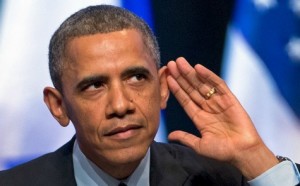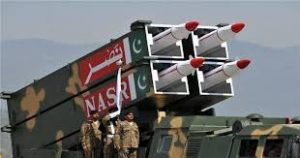Peace Watch » Editor's Take, Kashmir-Talk » Kashmir: South Asia Nuclear Flashpoint
Kashmir: South Asia Nuclear Flashpoint
Punchline
Kashmir: Obama’s Failure
By Z. G. Muhammad
It would be too early to say with surety, who makes it to the White House in the November 2016, Presidential elections. Nevertheless, one thing is certain that on the afternoon of January 20, 2017, Barack Hussein Obama will cease to occupy all power Oval Office. Like many of his predecessors, he will be relegated to the pages of history as the 44th President of the United States- historians to analyse his success and failures . It was after centuries of pain, suffering and struggle against racism; he was the first African-American to hold the office. It was believed, that he will carry forward the legacy of the Martin Luther King Jr, and stand by the side of the people denied their fundamental rights. This popular belief seemed coming true, when during his 2008, election campaign he talked about Kashmir. In an interview, he ‘emphatically stressed the need for the United States to try a fresh resolve the Kashmir Disputes as it was in the interest of the country.’ He, in fact, reiterated these assertions in his interview with MSNBC and other international magazines. From his interviews and speeches, one could read that like President Dwight D. Eisenhower, he also recognized the ‘potential danger Kashmir dispute posed to the American interests’ and global peace. It also emanated from his interviews to the press that compared to other candidates in the election fray he was fully acquainted with the history of the dispute. He knew India ‘reneged on its pledge to allow the Kashmiris to determine their future through a UN-supervised plebiscite. The candidate and President Obama had little doubt to quote Daniel Markey, Senior Fellow for India, Pakistan, and South Asia, Council on Foreign Relations, “that normalized relations between India and Pakistan, including a regionally acceptable settlement on Kashmir, would offer tremendous benefits to the United States. Indo-Pak tensions are especially dangerous because they bring two nuclear states toe-to-toe; they distract Islamabad from the urgent task of combating terrorists and militants on its soil, and they contribute to Pakistani suspicions about India’s activities in Afghanistan.
. It was after centuries of pain, suffering and struggle against racism; he was the first African-American to hold the office. It was believed, that he will carry forward the legacy of the Martin Luther King Jr, and stand by the side of the people denied their fundamental rights. This popular belief seemed coming true, when during his 2008, election campaign he talked about Kashmir. In an interview, he ‘emphatically stressed the need for the United States to try a fresh resolve the Kashmir Disputes as it was in the interest of the country.’ He, in fact, reiterated these assertions in his interview with MSNBC and other international magazines. From his interviews and speeches, one could read that like President Dwight D. Eisenhower, he also recognized the ‘potential danger Kashmir dispute posed to the American interests’ and global peace. It also emanated from his interviews to the press that compared to other candidates in the election fray he was fully acquainted with the history of the dispute. He knew India ‘reneged on its pledge to allow the Kashmiris to determine their future through a UN-supervised plebiscite. The candidate and President Obama had little doubt to quote Daniel Markey, Senior Fellow for India, Pakistan, and South Asia, Council on Foreign Relations, “that normalized relations between India and Pakistan, including a regionally acceptable settlement on Kashmir, would offer tremendous benefits to the United States. Indo-Pak tensions are especially dangerous because they bring two nuclear states toe-to-toe; they distract Islamabad from the urgent task of combating terrorists and militants on its soil, and they contribute to Pakistani suspicions about India’s activities in Afghanistan.
Thus, the long-standing dispute over Kashmir is one part of a wider regional dynamic that has direct implications for Washington’s ability to support a stable Afghan state and to address the threat posed by terrorist groups in South Asia.” Not only the Obama administration but many important analysts across the globe had almost reached a consensus that ‘the Road to Kabul runs through Kashmir’. Obama’s concern about the resolution of Kashmir had caused worry in the corridors of power in New Delhi. The national spokesperson of the BJP, then a famed journalist, M. J. Akbar had written in the Times of India (June 7, 2009) “A turbulent whisper is surging through Washington. Barack Obama wants peace in the life of his first term. He has discovered the magic potion that will kill the roots of two poisonous plants, Palestine and Kashmir. He has told Israel that he wants a definite route map towards an independent Palestine state by July. July is also the month during which Hillary Clinton is scheduled to visit the Indian subcontinent. In her baggage will be a war manual for Af-Pak and a peace prescription for Ind-PaK.” Notwithstanding, New Delhi not favouring the final resolution of Kashmir, in Washington saw it important for the American interests. Many I experts had impressed upon President Obama to follow a robust role for the settlement of this outstanding dispute. The fear about Kashmir causing a nuclear war between India and Pakistan had not only become the cause of concern in the South Asia alone but also in Washington. Ambassador Howard B Schaffer in his book the ‘Limits of Influence’ writing about India’s ambition to play major role on the international stage had rightly observed that ‘it will see Kashmir as an obstacle to seeking that recognition and it will have to be more ready to rid itself of this albatross.’ Fearing the conflict between India and Pakistan over Kashmir escalating into nuclear war between the two countries, he also has observed a ‘settlement has become more important to American interests in South Asia and beyond.’ Schaffer is not alone; there are many other strategic experts and Defence analysts who have been vociferously subscribing to this view. But, strangely enough despite recognizing Kashmir as the road to peace in Kabul and a potent threat to nuclear war between India and Pakistan in his second term in office failed to address the issue. Instead of having ensured peace in the region, during his last days in the White House, it seems his policy of deepening of US-India ties which Islamabad believes is centred on strengthening India’s military power will escalate tension between the two countries. The two countries are already in a confrontational mode with New Delhi reportedly pursuing the Cold Start doctrine and Islamabad focussing on developing Tactical Nuclear weapons (TNW) also known as a non-strategic nuclear weapon. To quote India Today; the goal of the Cold War doctrine, “is to establish the capacity to launch a retaliatory conventional strike against Pakistan that would inflict significant harm on the Pakistan Army before the international community could intercede. And at the same time, pursue narrow enough aims to deny Islamabad a justification to escalate the clash to the nuclear level. According to the Cold Start Doctrine, Battle Groups will be well forward from existing garrisons. India’s elite strike forces will no longer sit idle waiting for the opportune moment, giving Pakistan the luxury of time.” The Tactical nuclear weapon devised by Pakistan is seen as a deterrent against the Cold Start. These small nuclear weapons easily transportable can be used in battlefields, and some of them have the potential of causing greater destruction. This could spark a full-fledged nuclear war between India and Pakistan. It is high time for the world to rise to the clarion call and save the sub-continent from a nuclear holocaust.
The two countries are already in a confrontational mode with New Delhi reportedly pursuing the Cold Start doctrine and Islamabad focussing on developing Tactical Nuclear weapons (TNW) also known as a non-strategic nuclear weapon. To quote India Today; the goal of the Cold War doctrine, “is to establish the capacity to launch a retaliatory conventional strike against Pakistan that would inflict significant harm on the Pakistan Army before the international community could intercede. And at the same time, pursue narrow enough aims to deny Islamabad a justification to escalate the clash to the nuclear level. According to the Cold Start Doctrine, Battle Groups will be well forward from existing garrisons. India’s elite strike forces will no longer sit idle waiting for the opportune moment, giving Pakistan the luxury of time.” The Tactical nuclear weapon devised by Pakistan is seen as a deterrent against the Cold Start. These small nuclear weapons easily transportable can be used in battlefields, and some of them have the potential of causing greater destruction. This could spark a full-fledged nuclear war between India and Pakistan. It is high time for the world to rise to the clarion call and save the sub-continent from a nuclear holocaust.
Filed under: Editor's Take, Kashmir-Talk







